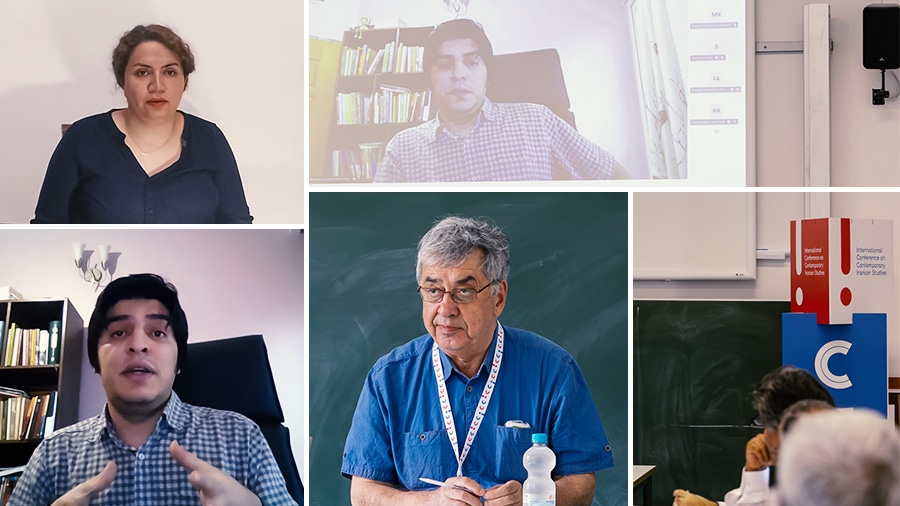This panel focuses its discussion on identity politics and nationalism, and how these issues impact the society of modern Iran.
Maryam Kalantar
Contrasting Patriotic and Nationalistic Approaches in the History of Contemporary Iran based on the Opinions of Maurizio Viroli
Seyed Ahmadreza Azmoun
Against Nationalist Ideas and Towards a Republican Homeland
Moderator: Mohammad Reza Nikfar
Abstracts
Maryam Kalantar
Contrasting Patriotic and Nationalistic Approaches in the History of Contemporary Iran based on the Opinions of Maurizio Viroli
Maryam Kalantar’s presentation examines the tension between patriotism and nationalism in modern Iranian history, drawing heavily from the work of Italian political philosopher Maurizio Viroli. Viroli differentiates patriotism from nationalism, arguing that patriotism fosters unity and freedom, whereas nationalism often leads to exclusion and, in extreme cases, fascism.
Kalantar applies Viroli’s framework to Iran’s socio-political history, particularly focusing on how the absence of left-wing patriotism contributed to the rise of extreme nationalism. According to Kalantar, while socialism and leftist movements historically supported internationalism and worker solidarity, they rarely engaged in creating a form of progressive patriotism. This oversight, according to Viroli’s analysis, left room for nationalistic sentiments to grow unchecked, which can, in extreme cases, undermine the quest for political freedom and equality.
Kalantar highlights Viroli’s concept of “patriotism for love of one’s country,” which he believes should be centered on political solidarity rather than cultural or ethnic homogeneity. This type of patriotism promotes freedom and equality for all citizens, without relying on rigid national or cultural identities. Kalantar argues that this notion of freedom as a collective project, where all citizens have equal political, social, and civil rights, is crucial for creating a just society.
In the Iranian context, Kalantar contends that the Constitutional Revolution (1905-1911) would not have been possible without a patriotic approach from the progressive forces involved in the movement.
However, following the suppression of the revolution, Iran witnessed the rise of extreme nationalism, particularly during Reza Shah’s reign, which sought to homogenize Iranian identity and reinforce state authority. Kalantar concludes by drawing on the ideas of French philosopher Gilles Deleuze to explore how collective political emotions—like the joy of increased collective power—can create the passion needed for citizens to commit to justice and freedom, aligning with Viroli’s vision of a patriotic but non-nationalistic republic.
Seyed Ahmadreza Azmoun
Against Nationalist Ideas and Towards a Republican Homeland
Seyed Ahmadreza Azmoun offers a different but related perspective, focusing on the Woman, Life, Freedom movement as a turning point in the social and political history of Iran. Azmoun argues that this movement represents a break from the traditional nationalist narratives that have dominated Iran’s understanding of its national identity.
Azmoun begins by critiquing the dominant nationalist discourse in Iran, which often revolves around maintaining a continuous and homogeneous link between modern Iran and its ancient past. He challenges the idea that nationalism has been an effective or productive force in shaping a free and equal society in Iran. In fact, he argues that nationalism, with its focus on cultural unity and continuity, often suppresses diversity and enforces a rigid, centralized conception of the nation.
Azmoun instead advocates for a republican conception of homeland, where political unity is based on the equal participation of free citizens, rather than a shared ethnic or cultural identity. This idea is deeply rooted in the values of political liberty and decentralization, opposing the centralizing tendencies of traditional Iranian nationalism.
He positions the Women, Life, Freedom movement as a significant moment in Iranian history, where a new form of collective identity is emerging—one that is not based on ethnicity, religion, or nationalism, but on shared political goals and values. Azmoun sees this movement as a revolutionary rupture from the past, offering an unprecedented opportunity to redefine the concept of homeland.
This new idea of homeland is characterized by its inclusivity, rejecting all forms of ethnic nationalism and identity politics that have historically divided the country. Instead, it envisions a republican framework where the nation is conceived as a political unit made up of free and equal citizens, with no need for cultural or religious homogeneity.
Azmoun’s proposal for a new theory of republicanism in Iran seeks to lay the groundwork for a society that values legal and political equality, rather than historical or cultural continuity. He argues that this shift away from nationalist identity politics is both necessary and urgent, given the historical failures of nationalism to produce a truly just and democratic society in Iran.
The session underscores the evolving debate around identity, nationalism, and patriotism in modern Iran. While Maryam Kalantar critiques extreme nationalism and advocates for a form of leftist patriotism inspired by Viroli’s ideas, Seyed Ahmadreza Azmoun envisions a break from nationalist ideologies altogether, advocating for a republican notion of homeland rooted in political equality and liberty. Both speakers highlight the importance of rethinking traditional concepts of national identity in order to foster a more inclusive, just, and free society in Iran.


